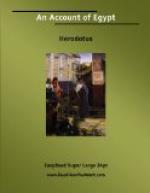by religion to say: and so many as there are
of the Carians dwelling in Egypt do this even more
than the Egyptians themselves, inasmuch as they cut
their foreheads also with knives; and by this it is
manifested that they are strangers and not Egyptians.
At the times when they gather together at the city
of Sais for their sacrifices, on a certain night they
all kindle lamps many in number in the open air round
about the houses; now the lamps are saucers full of
salt and oil mixed, and the wick floats by itself
on the surface, and this burns during the whole night;
and to the festival is given the name Lychnocaia
(the lighting of lamps). Moreover those of the
Egyptians who have not come to this solemn assembly
observe the night of the festival and themselves also
light lamps all of them, and thus not in Sais alone
are they lighted, but over all Egypt: and as
to the reason why light and honour are allotted to
this night, about this there is a sacred story told.
To Heliopolis and Buto they go year by year and do
sacrifice only: but at Papremis they do sacrifice
and worship as elsewhere, and besides that, when the
sun begins to go down while some few of the priests
are occupied with the image of the god, the greater
number of them stand in the entrance of the temple
with wooden clubs, and other persons to the number
of more than a thousand men with purpose to perform
a vow, these also having all of them staves of wood,
stand in a body opposite to those: and the image,
which is in a small shrine of wood covered over with
gold, they take out on the day before to another sacred
building. The few then who have been left about
the image, draw a wain with four wheels, which bears
the shrine and the image that is within the shrine,
and the other priests standing in the gateway try
to prevent it from entering, and the men who are under
a vow come to the assistance of the god and strike
them, while the others defend themselves. Then
there comes to be a hard fight with staves, and they
break one another’s heads, and I am of opinion
that many even die of the wounds they receive; the
Egyptians however told me that no one died. This
solemn assembly the people of the place say that they
established for the following reason:—the
mother of Ares, they say, used to dwell in this temple,
and Ares, having been brought up away from her, when
he grew up came thither desiring to visit his mother,
and the attendants of his mother’s temple, not
having seen him before, did not permit him to pass
in, but kept him away; and he brought men to help
him from another city and handled roughly the attendants
of the temple, and entered to visit his mother.
Hence, they say, this exchange of blows has become
the custom in honour of Ares upon his festival.
The Egyptians were the first who made it a point of religion not to lie with women in temples, nor to enter into temples after going away from women without first bathing: for almost all other men except the Egyptians and the Hellenes lie with women in temples and enter into a temple after going away from women without bathing, since they hold that there is no difference in this respect between men and beasts: for they say that they see beasts and the various kinds of birds coupling together both in the temples and in the sacred enclosures of the gods; if then this were not pleasing to the god, the beasts would not do so.




